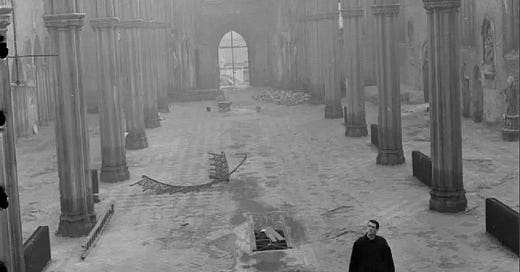Bombed Out, Yet Prayer Goes On: The Sixtieth Anniversary of “Sacrosanctum Concilium”
Where the real renewal is happening (hint: it’s not connected with “implementing Vatican II”)

In honor of the upcoming feast of the Immaculate Conception, Tradition & Sanity is running a special 20% discount on paid subscriptions. That would unlock this and every other Monday Exclusive, and, more importantly, help keep this venture afloat! I hope you’ll take advantage of this offer. — PAK
A high-point in self-destructive ecclesial behavior
Today, December 4, marks the sixtieth anniversary of the promulgation of the fateful document Sacrosanctum Concilium, the Constitution on the Sacred Liturgy of the Second Vatican Council, which was the first major document approved by the assembly, with an overwhelming majority that included Archbishop Marcel Lefebvre. For a long time, I sincerely tried to understand, appreciate, and embrace Sacrosanctum Concilium. I assigned it to students every time I taught a course on liturgy, and in our discussions I leaned into its best Catholic content (for there are some nourishing nuggets here and there).
But it was not possible, after reading Michael Davies, and later Henry Sire’s Phoenix from the Ashes and Yves Chiron’s biography of Annibale Bugnini, to see in this document anything more than a carefully contrived blueprint for liturgical revolution. It contradicts itself on several points and takes refuge more often than not in massive ambiguities that were deliberately put there (and this we know from documentary research, no need for conspiracy theories!). When you delve deeply into the history of this document—when you learn about the chicanery involved in its drafting, discussion, approval, and implementation—you have to get down on your knees to ask the Lord for the grace of faith, otherwise you will be in danger of losing it. Nowhere does the darkness of the human side of the Church appear more dark than in the systematically dishonest dismantling of centuries (and in some cases, millennia) of religious ritual.1
For me, the evaporation of the honorable status of Sacrosanctum Concilium came from a deeper reflection, thanks to a lecture by Wolfram Schrems, on its abolition of the Office of Prime. A document that would dare to abolish a liturgical office received and practiced for 1,600 years—part of the sevenfold diurnal prayer offered to God by monks, nuns, friars, hermits, deacons, priests, and bishops—cancels out its own authority. A bunch of practical pastoral recommendations such as form the bulk of this Vatican II “constitution” can obviously be mistaken. As I have pointed out many times, a proposal for action is neither true nor false (although it is usually justified in light of certain truths and can be argued against in the same way). A proposal for action is prudent or imprudent, wise or unwise, successful or unsuccessful.
Ever-mounting evidence indicates that the aims and means of the radical arm of the Liturgical Movement were grievously off-target, and the corresponding assumptions of the Council about what “had to be done” to the liturgy ended up misreading the signs of the times. These aims, means, and assumptions violated the axioms of religious anthropology, sociology, and psychology, not to mention those of dogmatic theology, moral theology, and ascetical-mystical theology.
Lefebvre, the signatory and later skeptic
Archbishop Lefebvre, like other conservatives at the Council, had been naïve enough to believe in 1963 that only the modest reforms agreed upon in the conciliar debates and texts would be executed, and that there would be, a few years later, a partially vernacular, slightly simplified, but still recognizably Roman Catholic liturgy. As I’ve documented here at T&S (see “Seeking the Origins of ‘Versus Populum’ in the United States”), the so-called 1965 missal, already an ugly enough duckling, was widely believed to be what the Council ordered.
Keep reading with a 7-day free trial
Subscribe to Tradition and Sanity to keep reading this post and get 7 days of free access to the full post archives.





